Each year, students at Winthrop University students are issued the newest student handbook which outlines Winthrop’s mission and dedication to excellence.
The handbook covers a variety of Winthrop’s policies and amenities and includes information on residence halls and meal plans, as well as student activities and engagement.
One of Winthrop’s main commitments is that of providing students, faculty and visitors with a safe environment. A key part of this is an environment safe from sexual misconduct. The mission of the Title IX of the Educations Amendments, which began in 1972, is to protect the public from “discrimination based on sex in educational programs or activities which receive Federal financial assistance” which applies to college campuses. According to Title IX, “No person in the United States shall on the basis of sex, be excluded from participation in, be denied benefits of or be subjected to discrimination under any education program or activity.”
Winthrop is committed to taking immediate and effective actions to respond to such threats on campus. Assistant Dean of Students and Director of Leadership Studies and Student Conduct Anthony Davis is educated in matters associated with Title IX. Davis explained how in the last two years, changes to the student handbooks have worked to “allow for flexibility in terms of how complaints are resolved.” Winthrop now has a staff specifically selected case by case to investigate and resolve given complaints which allows for all case investigators to remain impartial.
Students are provided with a variety of options for reporting incidents to campus authorities. Students can report online or in person, confidentially or anonymously. Some incidents may be subjected to limited confidentiality due to the overall safety of Winthrop’s campus. In addition to Davis, students can contact Assistant Dean of Students Miranda Knight. Davis and Knight do not resolve crimes, but they do investigate incidents. Students who are found responsible of violations of policy — which can include discrimination, harassment and sexual violence — can be met with a range of sanctions which depend on the severity of the violation. Davis said that the “range of sanctions” has not changed with the 2019-2020 student handbook.
Davis said that “students should know that they have complete decision-making authority in terms of doing a report” and added that students have several options when it comes to reporting incidents.
In 1990, The Jeanne Clery Disclosure of Campus Security Policy and Campus Crime Statistics Act was signed into law. The Clery Act requires all colleges and universities that are participants in financial aid programs on a federal level to disclose information about crime on campus. The Clery Act was enacted following the torture, rape and murder of Lehigh University student Jeanne Clery, who died in her dorm room at the hands of another Lehigh student.
Under the Clery Act, participating colleges and universities must publish security reports on an annual basis, maintain a crime log, give warnings about crime on campus in a timely manner and maintain crime statistics.
The data required under the Clery Act is available on Winthrop’s website. Case logs include dates when incidents were reported and/or occurred, the general location, a brief synopsis of the incident and disposition if known.
The ‘Red Zone’ is the first month and a half of a new school year when sexual assaults are most likely to occur on campus. Davis said that in order to combat the phenomenon of the ‘Red Zone,’ Winthrop “requires incoming and returning students to complete the Not Anymore program, a series of online modules designed to prevent sexual assault, dating and domestic violence.” Not Anymore is completed by students at the beginning of the fall semester every year prior to the start of the ‘Red Zone.’
In addition to contacting WUPD — which is open 24 hours a day, seven days a week — students who report incidents can, according to Davis, “report to the university and seek a resolution from the university via the Title IX process,” “report to the university and choose to only receive confidential support from a counselor on campus” or “do all of the above and any combination of the above.”
“Students should know that Winthrop is committed to educating students regarding Title IX matters and resolving complaints of this matter in a timely, diligent manner,” Davis said.
Photo: Tate Walden/ The Johnsonian




